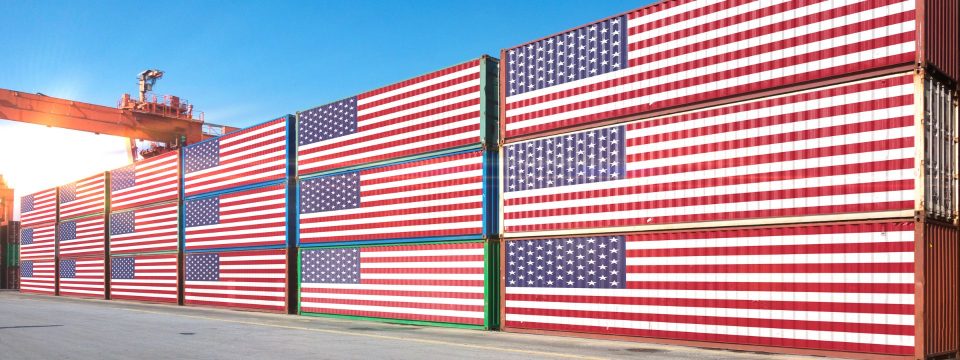Incoterms Insurance Responsibilities Explained: Who Insures What
October 28, 2022 Customs

Incoterms are a complex set of rules importers and exporters must understand when shipping goods internationally. One of the most important parts of each incoterm is insurance, with coverage differing depending on which term you choose. Without thinking this through, shippers and importers are often left wondering: who is responsible for taking out insurance, and am I covered should something go wrong in transit? Below we will reveal Incoterm insurance responsibilities.
If you’re looking to understand what insurance cover you need during a shipment, you’ve come to the right place. Below, we’ll explain how marine insurance interacts with the Incoterms, and explain whether the term you select appropriately divides the responsibilities for you in the shipping process. We’ll also look at how insurance is affected by each of these Incoterms.
Prior to reading on, we suggest you take a look at our map of the shipping process and read our Beginner’s Guide to Incoterms.
Insurance Responsibilities and the Incoterms
There is no general obligation in the Incoterms to provide any kind of marine insurance. Parties to a shipment are to make their own commercial decision as to what type of insurance they require when they are bearing the risk of a transaction.
The only exceptions are the CIF and CIP terms (explained below), which obligate exporters to have a freight insurance policy.
Despite this, we recommend regular importers have their own insurance policy irrespective of what the terms say. This is because the term you select influences who is liable for the cargo at different stages of the freight’s journey. Insuring your goods at multiple stages of the shipping voyage from manufacturing to delivery gives you peace of mind that your goods are protected.
When the Buyer is Responsible for Insurance
The buyer (also known as the consignee or the importer) is responsible for risk and insuring cargo from the moment it leaves the warehouse of origin under the following terms:
Ex Works (EXW)
The buyer has all the responsibility under the EXW term. The seller must make the goods available at a specific location but the buyer has to organise the collection, freight, delivery, tax payments and more. When the buyer collects goods from the premises, they are responsible for everything until the goods arrive at their final delivery point.
Insurance coverage: If you’re a buyer under this term, you are responsible for loss and damage under the so-called ‘main carriage’ of the journey. Freight is covered under an insurance policy for this. Many marine insurance policies, however, don’t automatically cover for the time when goods are on the seller’s premises or after loading and awaiting transit (even though buyers are responsible). It’s important to check your insurance policy to ensure you are covered for all parts of the journey.
Free Carrier (FCA)
The seller under these terms must make goods available to a carrier which the buyer nominates. The buyer assumes all responsibility and costs thereafter. The buyer also must arrange for export clearance.
Insurance coverage: The buyer is responsible during the ‘main carriage’ so FCA shipments require the importer to organise a marine insurance policy. Insurance would cover a buyer when the goods are delivered to the carrier. Note that, should you operate under this term, you’ll be exposing your freight to further risk as you’re delivering to a place other than a port. Check the country of origin’s exposures (including exposure to risk or hijacking) and insure accordingly if need be.
Free Alongside Ship (FAS)
The seller arranges export clearance and also makes goods available alongside the vessel at the relevant port of departure. They’re also responsible for origin charges. However, the buyer is responsible for loading the vessel and any charges following loading.
Insurance coverage: Once again, the buyer will be responsible during the ‘main carriage’. Buyers take on the risk of the cargo when the goods are placed alongside the vessel or after the goods are loaded.
Free on Board (FOB)
This term requires the seller to pay all origin charges (including loading onto the vessel). After this, however, responsibility shifts to the buyer who is responsible for freight, insurance and all charges thereafter.
Insurance coverage: The buyer is required to consider insurance under the FOB term given they are responsible for loss or damage during the ‘main carriage’ of the voyage. Buyers take on the risk once the goods “pass the ship’s rail” (a phrase used in the Incoterms to refer to when the goods are loaded onto a vessel and, effectively, ‘pass’ their rail). Insurers typically insure under this term from the date the On-Board bill of lading is issued.
Carriage Paid To (CPT)
The seller is responsible for making goods available at a place of destination. The buyer then must arrange any further transportation, and pay any duties and taxes. The buyer also then is responsible for arranging insurance during transit.
Insurance coverage: Insurance is the same for CPT as it is FCA.
Cost and Freight (CFR)
The seller has more responsibility under these terms, as they have to pay all charges up until the port of destination. The buyer, however, assumes risk when the goods are loaded on the vessel. Any charges at the final destination also must be paid by the buyer.
Insurance coverage: The buyer is responsible for loss or damage during the ‘main carriage’ of the voyage and are therefore should consider insurance. The buyer assumes risk once goods “pass the ship’s rail” (much like under FOB terms).
When the Seller is Responsible for Insurance
Under the following terms, the seller (also referred to as the exporter or the consignor) is responsible for insurance up to the port of arrival:
Carriage & Insurance Paid To (CIP)
Under CIP, the seller assumes responsibility for making the goods available at a place of destination. They also have to arrange insurance to cover the goods during transit. All the buyer has to do is arrange further transport, duties or taxes upon the goods’ arrival.
Insurance coverage: As mentioned above, CIP requires insurance to be taken out for the buyer. The terms under which insurance must be taken out are those under Clauses (A) of the Institute Cargo Clauses. This is a recent change introduced in Incoterms® 2020. This is the least restrictive clause and has quite an expansive coverage (therefore, it’s generally more expensive).
Cost, Insurance and Freight (CIF)
CIF only applies to maritime shipments (not air freight). Under these terms, sellers assume responsibility for the goods and insurance up until the goods arrive at the destination port. The responsibility then shifts to the buyer when the goods arrive.
Insurance coverage: CIF also requires insurance to be taken out. However, the level of cover required is Institute Cargo Clause (C), which is more restrictive and generally the most affordable option.
If shipping is on CIP or CIF terms, buyers should check that their insurance cover is for the total cost of goods rather than just a portion of it.
The seller will be responsible for the risk of cargo damage up to the door of destination (but is not obliged to insure cargo) under the following terms:
- Delivered at Place (DAP): Under DAP, the seller is responsible for all charges up until the goods are delivered to the end destination. The buyer only assumes responsibility for unloading the goods and any duties or taxes.
- Delivered Duty Paid (DDP): This is arguably the most buyer-friendly term. Sellers are responsible for practically the whole shipment. They are responsible for import clearance and must ensure goods arrive at the end destination. All buyers have to do is pay to unload the goods when they arrive.
- Delivered at Place Unloaded (DPU): This is a new Incoterm, having replaced Delivered at Terminal (DAT). DPU permits sellers to deliver goods after they’ve been unloaded from the transport and obligates them to unload goods at the place of destination.
Insurance coverage: Insurance is the seller’s responsibility under all of the above terms. It’s not required, but sellers are likely to purchase insurance on behalf of their buying customers to cover the wide range of circumstances for which they are responsible.
It’s important to specify the exact ‘place’ the goods are to be delivered to in the sale contract – i.e. the exact street address if possible. This will avoid disputes between the parties in the future.
Check your Coverage
Insurers are becoming more and more risk-averse, with the complexities of international shipping contributing to what’s been called the ‘hardening’ of the insurance market. This means premiums are becoming more expensive and the cover is harder to secure.
We recommend:
- Always clarify with the insurer what your insurance actually covers. The Institute Cargo Clauses, of which most freight insurance policies in Australia are based, have plenty of exclusions. You don’t want a policy excluding something fundamental to your shipment.
- Consider what term you’re buying on so you don’t double up on insurance cover. You don’t want to take out the same insurance policy twice with both the importer and exporter paying a set of fees.
- Make sure you have end-to-end coverage. Shipowners are obligated under what’s called the ‘Hague Visby Rules’ to compensate you if your goods are damaged on a maritime voyage. But this liability is limited. It’s critical to attain the extra insurance, otherwise, you could lose a significant value of your goods.
Understanding the Incoterms underpinning your sales contract and the insurance that covers you is critical when engaging in domestic and international shipments. Use your forwarder to manage your marine insurance and request a certificate of currency to outline your policy.
Please feel free to contact one of our friendly shipping and freight specialists at ICE for further information on the Incoterms and insurance responsibilities.
Request A Quoteor call us on 1300 227 461
Recommended For You

We Consult. We Plan. We Deliver.
- CONSULT – We discuss your specific needs.
- PLAN – We develop a bespoke tailored plan that is cost-effective & efficient.
- DELIVER – We manage your shipment and keep you updated from beginning to end.


